This guide includes a list of the best semantic SEO tools to help optimize your content for search engines.
The following tools and software are the most popular resources to search for semantically-related keywords, many of which are completely free semantic SEO tools you don’t have to pay for.
Consider this your quick and helpful guide to finding the top semantic SEO software and tools for your needs and budget.

Best Semantic SEO Tools & Software
1. Google
When it comes to finding the best semantic SEO tools for content optimization, Google is a great place to start. Typing a keyword or phrase into this search engine will pull up the usual search results and two essential sections that can be harnessed for semantic SEO.
The first area to look in the search engine results pages (SERPs) is the “People Also Ask” section which brings up similar search terms users may be looking for. In the example image below, you’ll see the semantically-related People Also Ask questions for the search query “art tutorials”.

This gives you an idea of what people are looking for, which is helpful if you want a clearer picture of user intent. And, gives you great ideas for thematically-related sections to include in your content as H2 subheadings.
You can also use the”‘Related Searches” tool in Google Search for semantic SEO research, which offers similar information in the form of keyword phrases.

As you can see, this section brings up a helpful list of conceptually-related key phrases you can use in your content or to spark ideas for new articles that can be clustered together to build an SEO silo structure to boost topical authority.
You can also type into Google and allow the autocomplete feature to come up with ideas like you see in the example image below.

This is a quick and straightforward way to collect semantically related keywords using Google’s free search tools. The only downside of using these tools is that you can’t just click a button to collect a full list of keywords and topic ideas quickly; you’ll have to collect the words and phrases manually in a spreadsheet or document.
2. LSIGraph
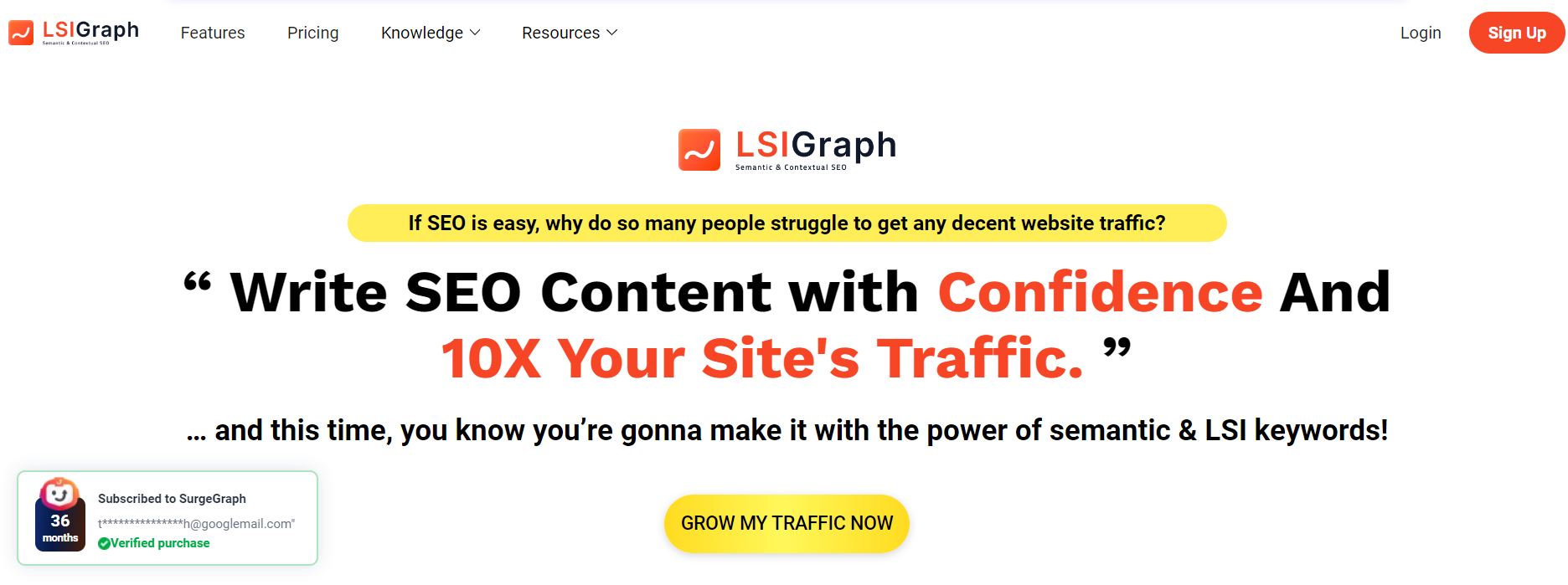
LSIGraph is one of the most popular semantic SEO tools on the market, as it works incredibly quickly at showing you the scores of semantically linked terms that are related to your primary keyword for SEO.
An excellent option for developing your content marketing strategy, the LSIGraph platform doesn’t just give you your semantic keywords but also provides a comprehensive set of data about each one.
This data includes:
- Search Trends
- Search Volume
- CPC (Cost-Per-Click)
- LSV (Latent Semantic Value)
If you’re looking for the top semantic SEO tools that offer the most prominent and accessible data to help you create semantically rich content for a boost in topical relevance, then LSIGraph is the one to try here.
3. Semrush Keyword Magic Tool
One of the best free semantic SEO tools you can use is Semrush’s Keyword Magic tool. That link is our affiliate partner link which gives you an extended free trial for the Pro plan; however, you can continue using the tool with 10 free keyword searches per day without paying for a subscription.
As you can see in the example image below, we have typed in the phrase “art supplies”. This brings up the general keyword search results. But by clicking on the Related” tab, we get the following results:
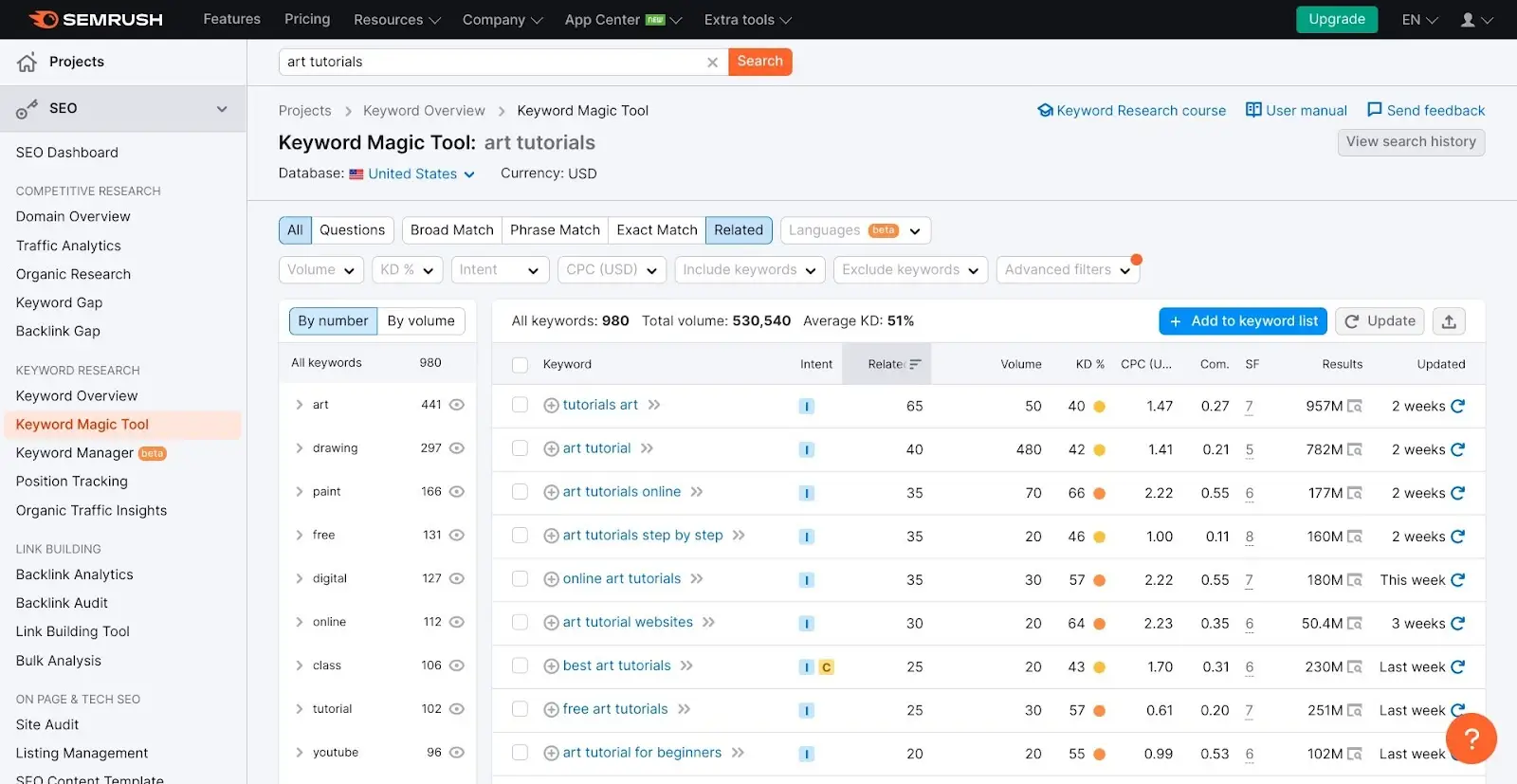
These keywords help you uncover additional semantic keyword phrases that match user search intent. For example, people who are searching for art tutorials may also be interested in online art tutorials, free art tutorials, or art tutorials for beginners, which Semrush’s Keyword Magic Tool displays.
4. Moz Keyword Explorer
The Moz Keyword Explorer is similar to Semrush’s Keyword Magic Tool. Typing in a keyword will bring up the usual keyword search results as you see below.
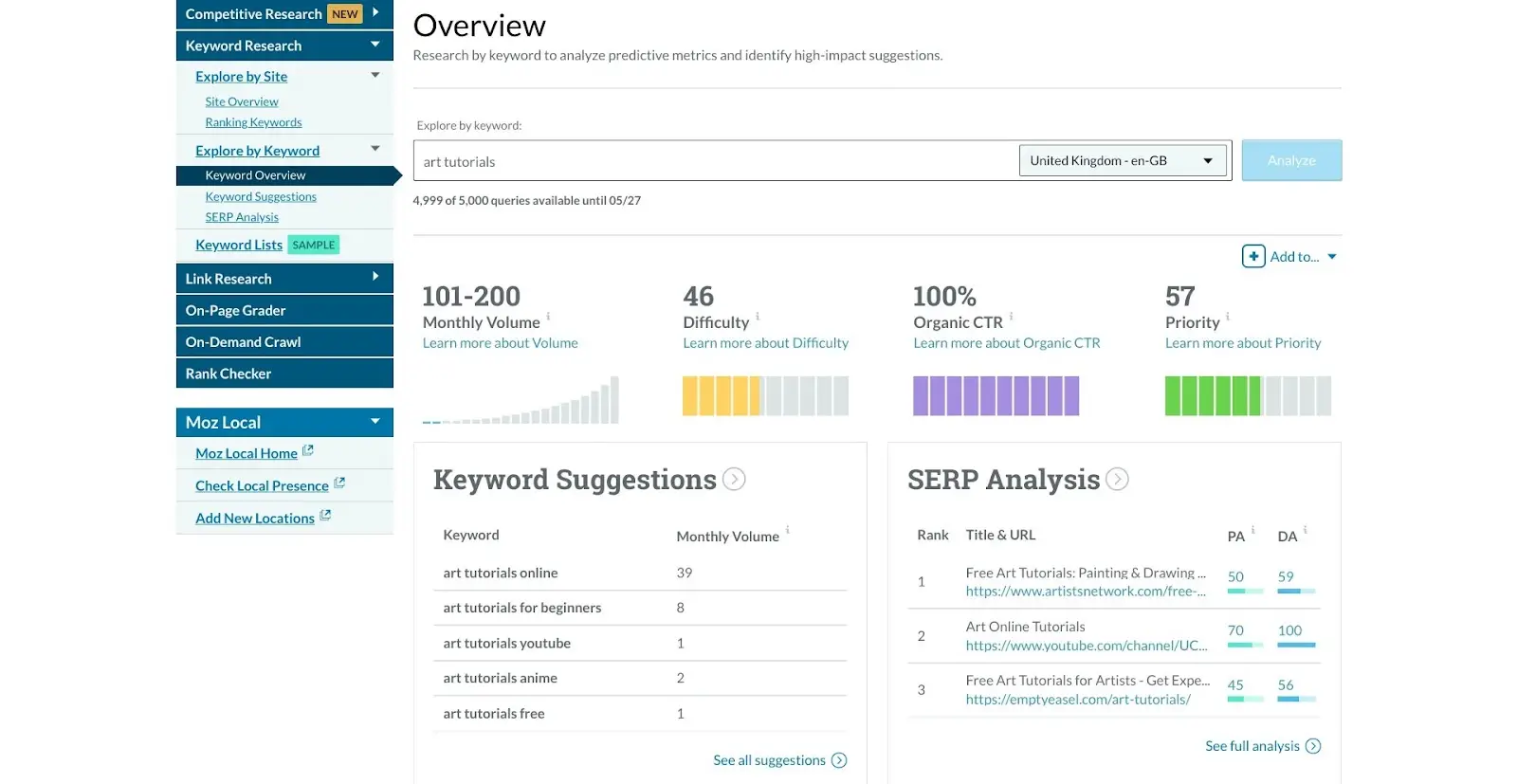
Clicking “Keyword Suggestions” will lead you to a range of keywords that may be useful. In this case, “art tutorials online”, “art tutorials free”, and “art tutorials for beginners”. You can view these by relevancy and monthly search volume as well.
5. Ubersuggest
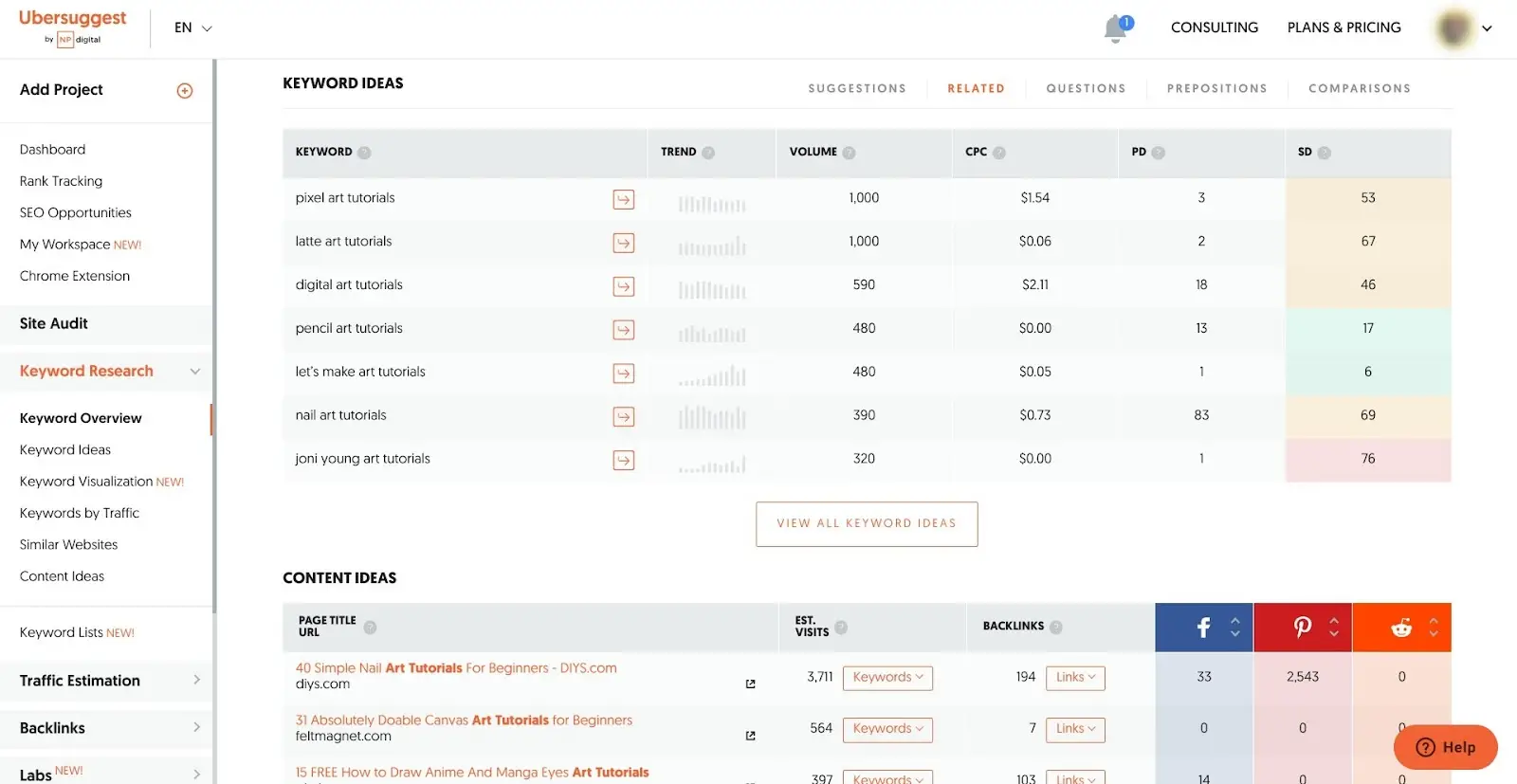
Ubersuggest is another excellent option for semantic SEO software. For example, clicking “Keyword Research”, then “Related” brings up some semantic keywords, color-coded by their difficulty level.
Here, the results are precise: “pixel art tutorials”, latte art tutorials”, and “digital art tutorials”. You can also scroll down to “Content Ideas” to get a helpful list of links to check out. You can view their page views, backlinks, and even the number of social media shares they have.
Ubersuggest is excellent for developing new content ideas, especially if you’re just starting out with semantic SEO and want affordable software that comes bundled with other analysis tools.
6. Twinword Ideas LSI Graph
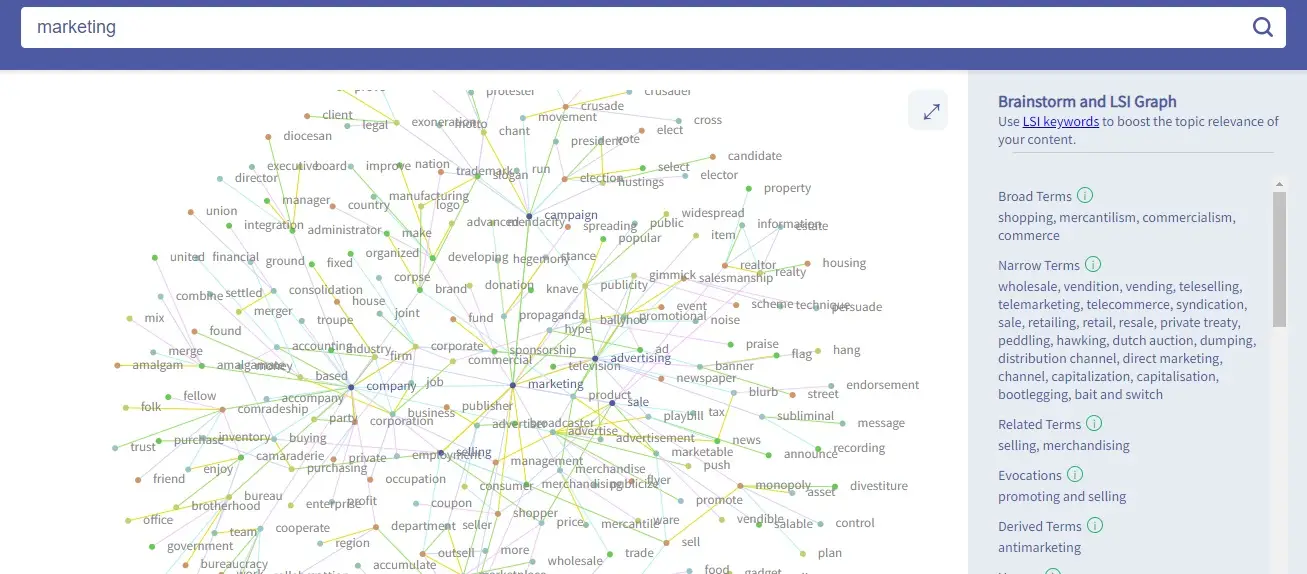
The Twinword Ideas LSI Graph is another good tool for semantic SEO because it provides a simple way to create detailed visualizations of the semantic relationships between keywords.
Just type in the primary head term you want to use, press enter, and in a matter of seconds, you’ll be presented with an enormous number of conceptually-related keywords with definitions, usage examples, related terms, and more.
This tool is a great, and free, way to brainstorm ideas to improve your content’s topical relevance. Plus, you get a breakdown of terms sorted by type: broad, narrow, related, evocations, and synonyms.
7. Google Trends
Google Trends is a free semantic SEO tool offering insight into the popularity of a specific search term in any particular region. For example, searching for “art tutorials” in the US brings up this helpful graph to gauge user interest over time.
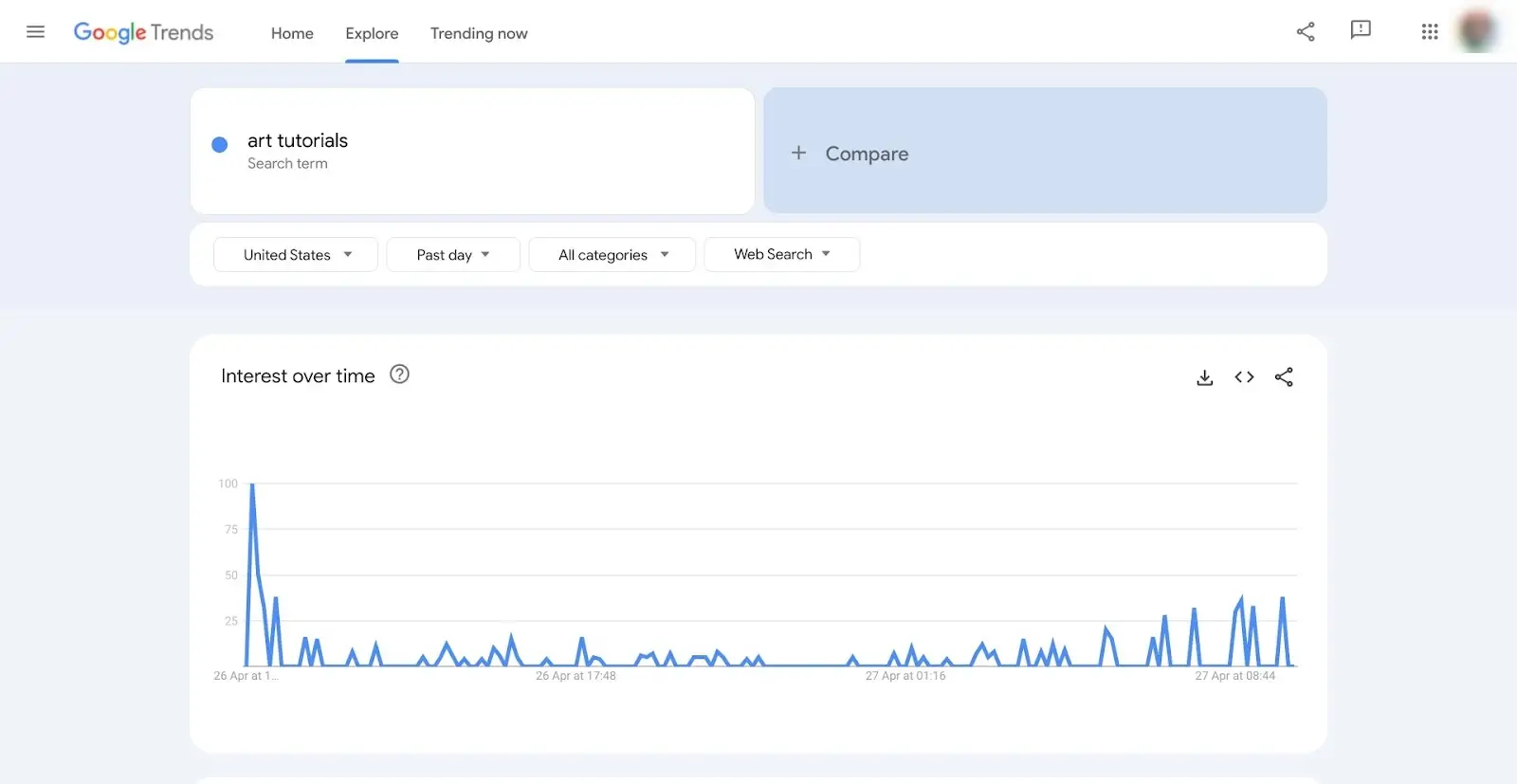
You can also scroll down to find some valuable tools for semantic SEO research. The “Related Topics” and “Related Queries” sections will help you to gain a deeper insight into what people are interested in when they use a certain search term. Plus, you can quickly check the trending results for the related topics, too, meaning you can quickly see if people are interested in these ideas.
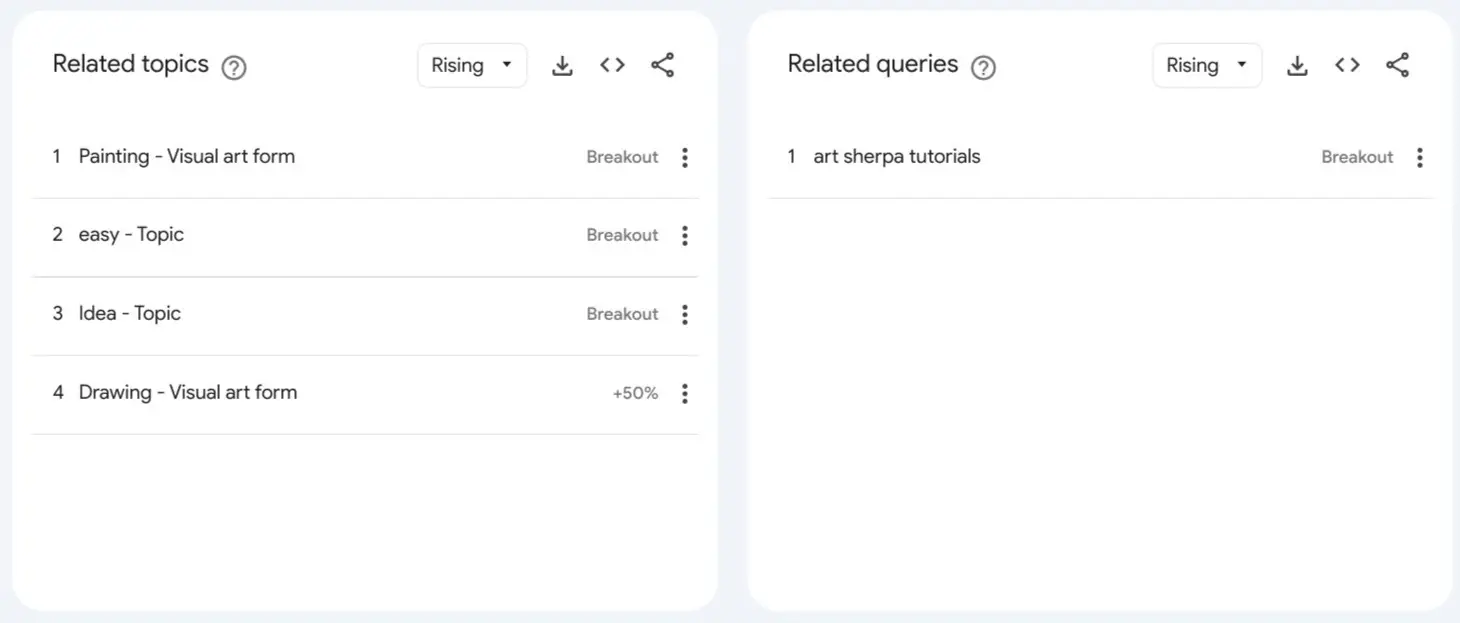
Keeping on top of trending topics and queries within your niche is critical for SEO. And using the free Google Trends tool is great for analyzing the potential success of your semantically-related keywords.
Google Trends also helps you better optimize your content for search, creating content that people will find helpful and relevant. This will help improve your website’s overall SEO signals, give you rich opportunities for new content (and many inner linking options), and even improve your topical authority, positioning your site as a source of knowledge in your niche.

8. Surfer SEO
Surfer SEO is one of the best content optimization tools for semantic SEO because it performs a data-driven analysis that allows you to compare your web pages to the top-ranking URLs on the SERPs before and after you publish the content.
With the audit feature, you know what’s missing from your content plan, website, and specific web pages so you can become more visible and rank better. The keyword research feature allows you to find the right keywords, frequently asked questions, headings, and word count that you should use in your content on the content editor.
As you start to write your article, Surfer SEO can also help generate an outline for you with semantically-related words and phrases and even provide content suggestions that will help boost your rankings.

Surfer SEO is a top tool to use for semantic SEO because it harnesses the power of Natural Language Processing (NLP) to extract the entities (relevant words and phrases) related to your main keyword. With NLP-based guidelines, you’ll know which terms you should use, where, and how often to let Google know your content is highly relevant to your target query.
Learn More About Semantic SEO
The following links explain more about semantic SEO and how to use it to improve your keyword rankings. Use these resources to boost your knowledge on the subject.
- Semantic Keyword Research Explained
- How to Find Semantic Keywords
- Best Free LSI Keyword Generators & Research Tools
- Semantic Search vs Keyword Search
Semantic SEO Tools & Software Summary
We hope you enjoyed this guide on the best semantic SEO tools.
As you discovered, there are several top semantic SEO tools you can use to improve your content optimization and website’s topical authority. All the semantic SEO software we have covered here are great options to help you to identify semantically related keywords, which is vital for building practical, relevant content for users, and search engines like Google, Yahoo, and Bing. Feel free to test out all of the tools and software on this list to get a feel for how each one works, and to ultimately find the solution that best meets your needs and budget.

SEO Chatter is dedicated to teaching the fundamentals of search engine marketing to help marketers understand how to increase organic website traffic and improve search engine rankings.
